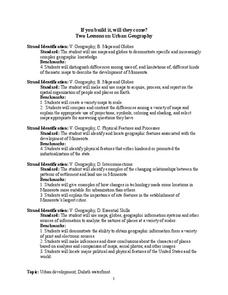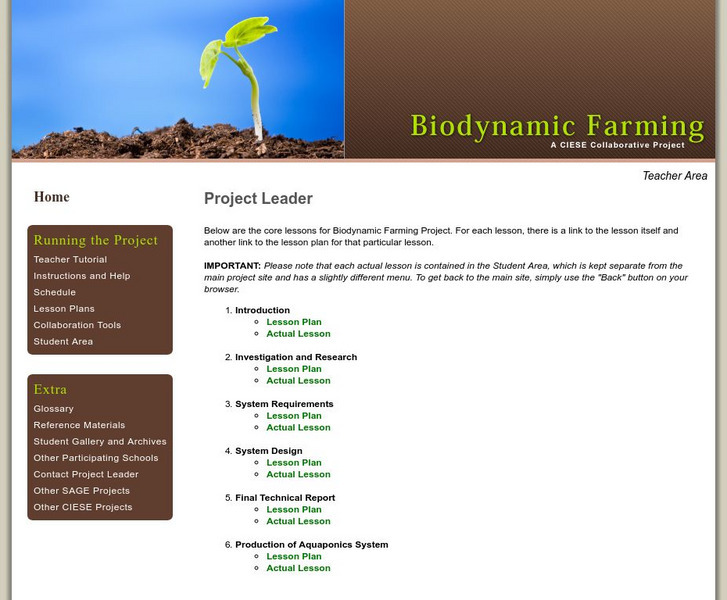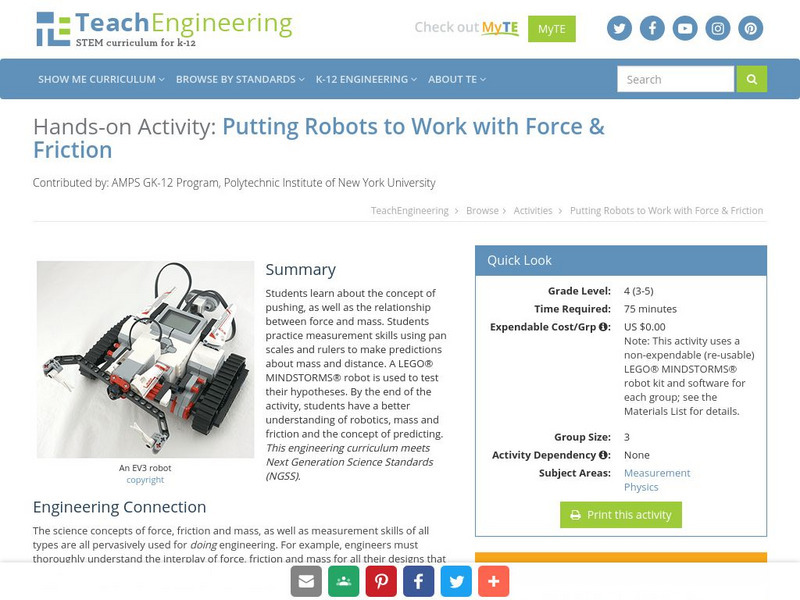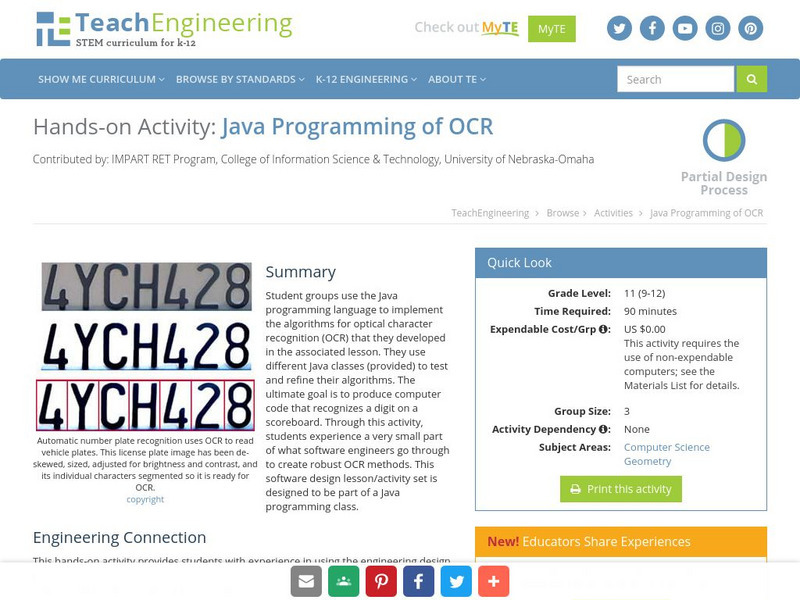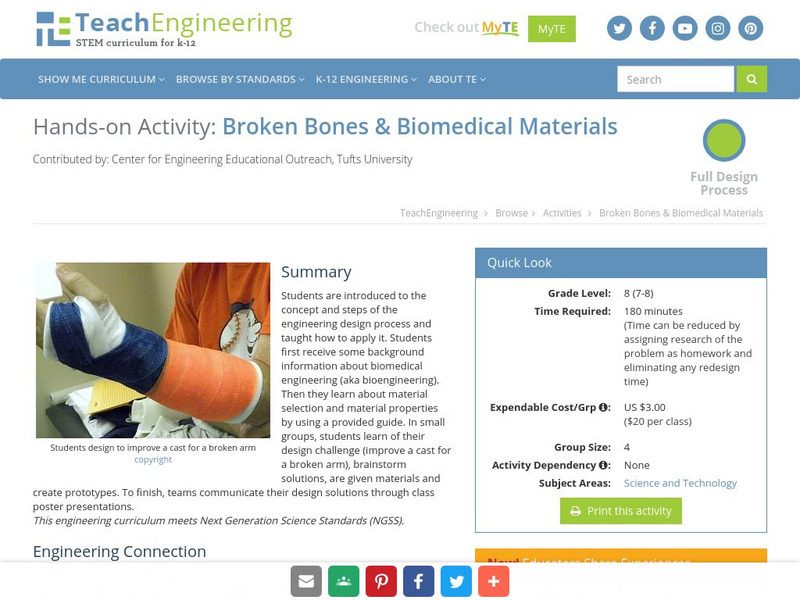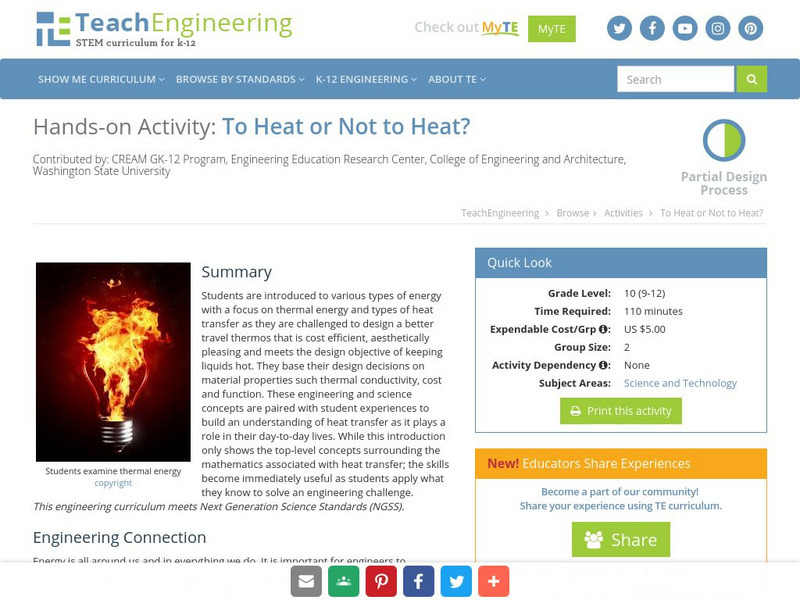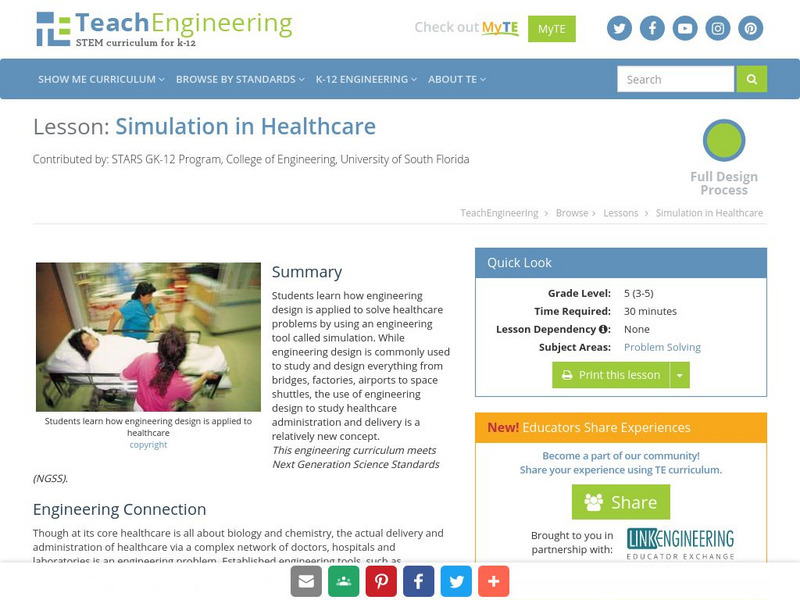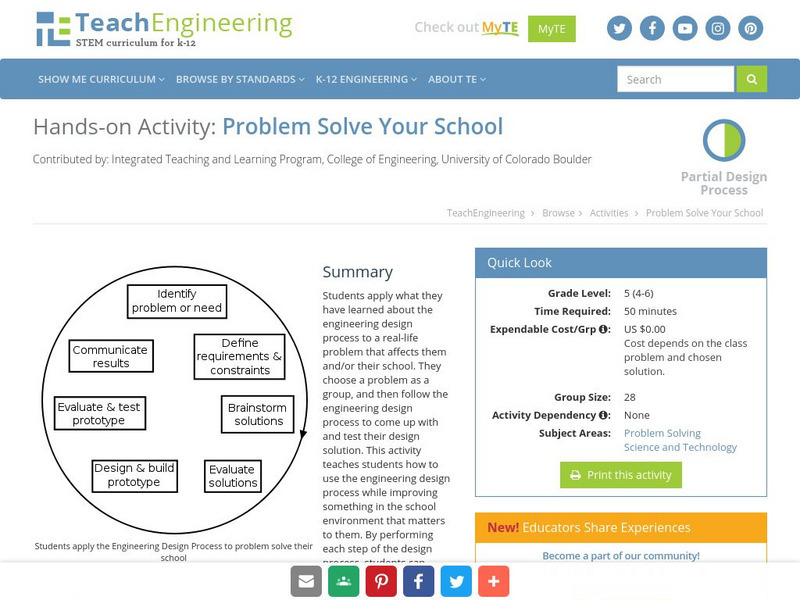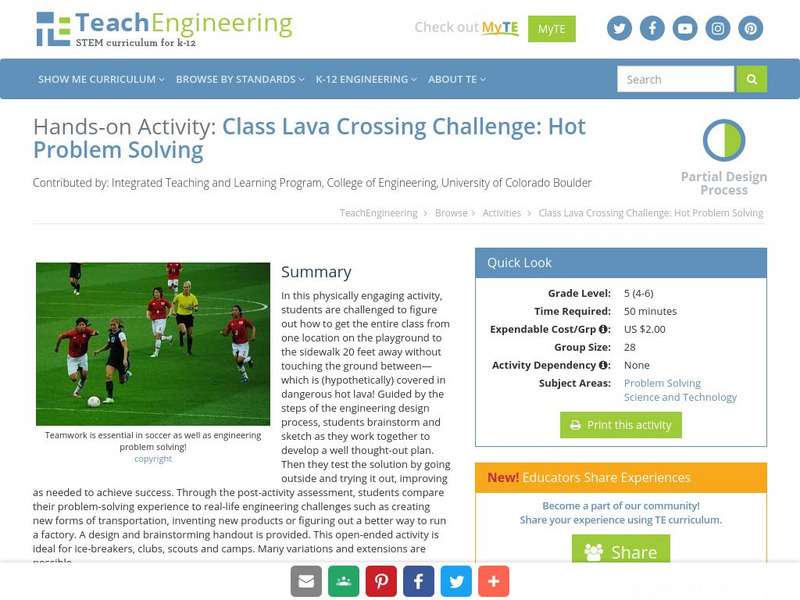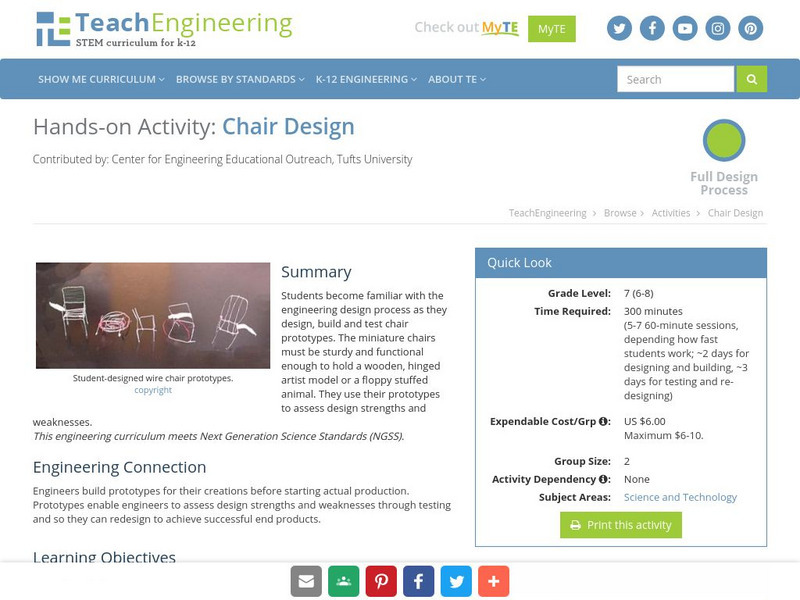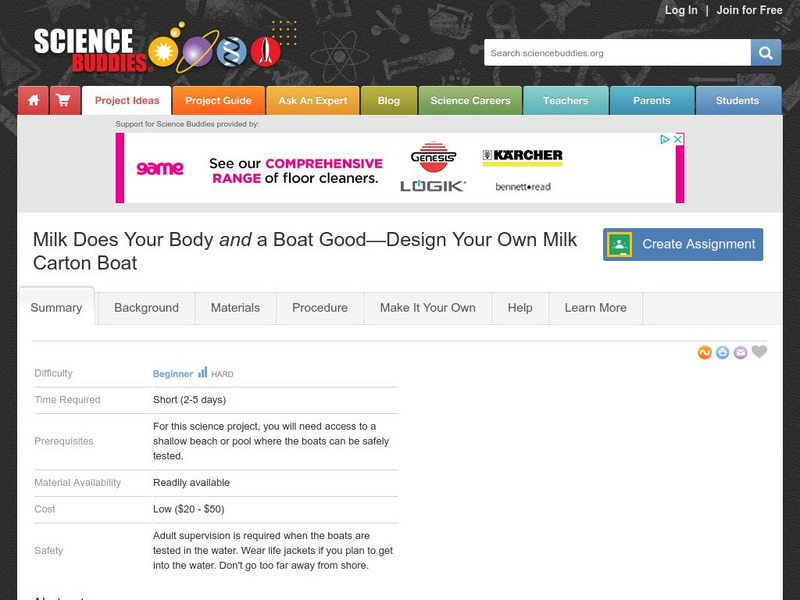Curated OER
Using the Engineering Design Process to Dress for the Weather
Students study weather and define the appropriate dress for various weather patterns. In this weather and clothing lesson, students discuss wearing appropriate clothes for specific weather. Students use the weather board to determine the...
Curated OER
If You Build It, Will They Come?
Students examine the city of Duluth, Minnesota. In groups, they use the internet to discover its current state of urban geography. After their research, they create and plan their own redeveloping of the city. They share their results...
Curated OER
Invent a Backscratcher from Everyday Materials
Students explore the design process. They discuss why new products are made, examine backscratchers brought in from home and discuss why it is a useful device, and working with a partner draw and construct a backscratcher.
Center for Innovation in Engineering and Science Education, Stevens Institute of Technology
Ciese: Biodynamic Farming
During this module students learn about biodynamic farming through hands-on activities that culminate in having multiple schools collaborate to design subsystems that are combined to make a working aquaponic system. During the SAGE...
PBS
Pbs Learning Media: The Leaning Tower: Where It Stands Today
Will the Leaning Tower of Pisa give way to gravity? In this interview from the NOVA Web site, engineer John Burland relates the difficult job of saving the tower.
PBS
Pbs Learning Media: Simple Solutions
Amy Smith is an engineer who designs simple and inexpensive solutions to real-world problems. This video produced for Teachers' Domain features her innovative design for testing the safety of drinking water in the developing world.
TeachEngineering
Teach Engineering: The Power of Food
Students imagine they are stranded on an island and must create the brightest light possible with the meager supplies they have on hand in order to gain the attention of a rescue airplane.
TeachEngineering
Teach Engineering: Swinging With Style
Students experientially learn about the characteristics of a simple physics phenomenon - the pendulum - by riding on playground swings. They use pendulum terms and a timer to experiment with swing variables. They extend their knowledge...
TeachEngineering
Teach Engineering: Putting Robots to Work With Force & Friction
Students learn about the concept of pushing, as well as the relationship between force and mass. Students practice measurement skills using pan scales and rulers to make predictions about mass and distance. A LEGO MINDSTORMS NXT robot is...
TeachEngineering
Teach Engineering: Java Programming of Ocr
Student groups use the Java programming language to implement the algorithms for optical character recognition (OCR) that they developed in the associated lesson. The ultimate goal is to produce computer code that recognizes a digit on a...
TeachEngineering
Teach Engineering: Trigonometry via Mobile Device
Students investigate the relationships between angles and side lengths in right triangles with the help of materials found in the classroom and a mobile device.
TeachEngineering
Teach Engineering: Constructing Sonoran Desert Food Chains and Food Webs
Is the food chain shown above accurate? Does the first link depict a producer, the second link a herbivore, and the third link an omnivore / carnivore? Students must correctly determine whether a species is a producer or consumer, and...
TeachEngineering
Teach Engineering: Broken Bones
The purpose of this activity is to introduce students to the concept of the engineering design process and to teach them how to apply it. In "Broken Bones," students will explore the steps of the engineering design process. They will...
TeachEngineering
Teach Engineering: To Heat or Not to Heat?
Students are introduced to various types of energy with a focus on thermal energy and types of heat transfer as they are challenged to design a better travel thermos that is cost efficient, aesthetically pleasing and meets the design...
TeachEngineering
Teach Engineering: Robot Design Challenges
Through the two lessons and five activities in this unit, students' knowledge of sensors and motors is integrated with programming logic as they perform complex tasks using LEGO MINDSTORMS NXT robots and software.
TeachEngineering
Teach Engineering: Latex Tubing and Hybrid Vehicles
This unit gives students the opportunity to make use of linear models in order to make predictions based on real-world data. Students experience how engineers address incredible and important design challenges through the use of linear...
TeachEngineering
Teach Engineering: Do You See What I See?
Students research OCR and OCR techniques and then apply those methods to the design challenge by developing algorithms capable of correctly reading a number on a typical high school sports scoreboard.
TeachEngineering
Teach Engineering: Simulation in Healthcare
Learners learn how engineering design is applied to solve healthcare problems by using an engineering tool called simulation. While engineering design is commonly used to study and design everything from bridges, factories, airports to...
TeachEngineering
Teach Engineering: Problem Solve Your School
Students apply what they have learned about the engineering design process to a real-life problem that affects them and/or their school. They chose a problem as a group, and then follow the engineering design process to come up with and...
TeachEngineering
Teach Engineering: Hot Problem Solving
Student teams follow the steps of the engineering design process to meet the challenge of getting their entire class from one location on the playground to the sidewalk without touching the ground between. The class develops a well...
TeachEngineering
Teach Engineering: Chair Design
Students become familiar with the Engineering Design Process as they design and build prototypes for a chair. The miniature chair must be sturdy and functional enough to hold a wooden, hinged artist model or floppy stuffed animal.
Other
Biomimicry Institute: Ask Nature
Many products in our world are designed by engineers and scientists whose inspiration and ideas come from nature. Presents strategies that humans have learned from nature and products that have been designed using nature's principles.
Science Buddies
Science Buddies: Hull Design and Hydrodynamics
Experiment with designs of different hulls for boats to see which hulls are suited for which purpose. The Science Buddies project ideas are set up consistently beginning with an abstract, objective, and introduction, followed by a...
Science Buddies
Science Buddies: Design Your Own Milk Carton Boat
Design different hull designs for boats from milk cartons and experiment with which hull will glide the fastest, be most maneuverable, and which will support the most weight. The Science Buddies project ideas are set up consistently...



